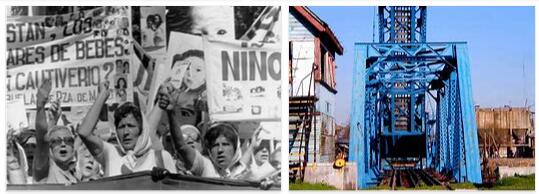The enthusiasm aroused by this fact of arms was extraordinary not only in Spanish America, but also in all of Europe; minus England, of course, which was mortified, and irritated to the point of preparing a new expedition under the command of the future Duke of Wellington; but then he could not carry it out due to the events in the Iberian Peninsula. Liniers was hailed as a triumph, appointed viceroy in place of the ignorant Sobremonte, created count of Buenos Aires; the rich cities of upper Peru sent him trophies of solid gold. The participation of the Creoles, in such an enormous majority, in the defense of Buenos Aires, which means in the defense of Spain in its colonies, cannot fail to surprise. They did nothing but travailler pour le roi de Prusse, who in that case was the king of Spain, their master. If they had welcomed the English, they would have had only one other master. True, there were with the Spaniards blood ties that cannot be forgotten, and with the English there were differences of race and religion; but on the other hand they could not forget the ancient and present oppressions of the Spanish government, nor could they disguise that English domination would give much more to national wealth and well-being. Perhaps the Creoles feared that English rule would become stable (yet there was the fresh example of North American independence), while the Spanish power was already showing signs of its decline. It is difficult to admit it, because in this case the Creole forces, having proved capable of operating on their own, would have at the same time chased away the British invaders and killed the representatives of the royal authority. It is therefore necessary to deduce, from the facts of the “Reconquista” and “Defensa”, that loyalist sentiments were still very strong in the Creoles, and that the ideas of independence, even if they matured in the minds of some precursors, were a dead letter for the almost all of the country’s children. Be that as it may, that war episode had capital importance in Argentine history, in the sense that the Creoles, revealing themselves capable of high military virtues, began to wonder why they should not also participate in the direction of public affairs; and from this to the idea of independence was a very short step. in the sense that the Creoles, having revealed themselves capable of high military virtues, began to wonder why they should not also participate in the direction of public affairs; and from this to the idea of independence was a very short step.
According to clothesbliss.com, Liniers had been appointed interino viceroy in May 1808, and there had already begun to manifest disagreements between him and Cabildo, in the person of his “first-vote alcalde” Martin de Alzaga, when at the end of July the news of the resignation of Charles IV and the coronation of Ferdinand VII, and in mid-August the Marquis of Sassenay landed, commissioned by Napoleon to negotiate with Liniers. Mistrust grew against the viceroy, who, forgetting his high merits very quickly, began to reproach him for being a foreigner. Let us mention, in passing, the vain attempts, in that year, of Princess Carlotta Gioacchina of Portugal to obtain the crown of the Plata; attempts moved especially by Saturnino Rodríguez Peña, and favored, at first, by patriots in good faith, such as Belgrano, Moreno, Pueyrredón, Paso, Funes. The campaign against Liniers was moved from Alzaga to Buenos Aires, and to Montevideo, where he was governor, by Colonel Elío, a Spaniard. He, replaced by Michelena, did not obey, and the summoned Cabildo (the alcalde was a Parodi) decreed disobedience to the viceroy, the maintenance of Elío and the creation of a government council, similar to the Spanish ones. On the first day of 1809 the Spaniards, among whom, besides the Alzaga, were the bishop Lué, the team leader Ruiz Huidobro, the brigadier Molina and other officers, after a demonstration in which it was shouted: “The junta as in Spain! Down with the French Liniers! “, They managed to wrest the resignation from the viceroy; while in the headquarters of the Cabildo a supreme council, composed exclusively of Spaniards, was appointed by acclamation, except for two Americans: Mariano Moreno and Julián de Leiva. But the Creole troops of the patricios and arribeños (provincial militias), led by the Saavedra, dispersed the Spanish conspirators, and persuaded Liniers to withdraw his resignation. The central junta of Spain, which then resided in Seville, appointed a new viceroy in person of Baltazar Hidalgo de Cisneros. The revolutionary group (since such a truly could now be called the one formed by Castelli, Belgrano, Pueyrredon, Rodriguez Peña, etc.) tried in vain to induce Liniers not to transmit the command to the new viceroy: the French, with great consistency, refused to do this act of indiscipline. His loyalty led him later, with a triumphant revolution, to take up arms for the metropolis against the patriots;
